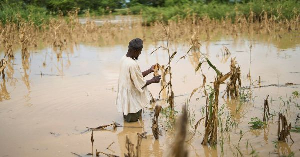Regional News of Tuesday, 24 November 2020
Source: GNA
20-member forest guard inaugurated to preserve reserves in Ashanti Region
A 20-member Community Forestry Protection Guard (CFPG) to safeguard forest reserves in the Ashanti Region has been inaugurated.
The CFPG will comb around the Tano-Ofin, Asenanyo, and Jimira Forest reserves and the Ofin Shelter Belt in the Atwima Nnwabiagya Municipal and Atwima Mponua District of the Region to control human activities that deplete the resources.
The Livelihood and Environment Ghana (LEG), a non-governmental organisation, in collaboration with the Forestry Services Division, and the University of Energy and Natural Resources (UENR) inaugurated the Guard.
They were selected from forest fringe communities including Okyerekrom, Kofi Nyamekrom, Akyerayaso, Ataso, Nyinahin, Nwirem, Ampenkro, Pamuso, Wansamere, Mmoframfaadwene, Akorabourkrom, Antwi Agyeikrom and Bofaaso.
At a forum at Nyinahin, Dr Daniel Akoto Sarfo, a Senior Lecturer and Head of Centre for Climate Change and Gender Studies at the UENR, Fiapre, near Sunyani, said sustainable forest management continued to be a major challenge in the country.
He said Ghana had ratified several global treaties and conventions such as the Forest Stewardship Council’s Certification Programme, and European Union’s Voluntary Partnership Agreement for forest sustainability.
However, sustainable forest management had seriously been challenged by climate change and human activities such as hunting, illegal lumbering and mining, and bushfires.
Dr Sarfo, therefore, called for concerted efforts of stakeholders including civil society organisations and actors, academia, traditional authorities, security agencies and forest fringe communities to help control irresponsible human behaviours detrimental to sustain the forest resources.
Sustainable forest management and preservation, he explained, had enormous benefits for present and future generations.
“To achieve sustainable forest management in the country, several forest management plans had been developed. All forests in the country have been grouped into the Forest Management Unit (FMU) and the unit has a unique climate and biological description, which requires specific management prescription towards protection, production, convalescence, research and education and Conversion,” Dr Sarfo said.
He told the guards that the task ahead was enormous and urged them to work hard and support the local forestry officials to protect the reserves.
Mr Richard Adjei-Poku, the Executive Director of LEG, expressed appreciation to the Womadix and Global Green Grants funds for supporting the campaign to sustainably manage the forests.
“There is a symbiotic relationship between trees and humans breathing in oxygen and exhaling carbon dioxide and trees breathe in carbon dioxide and exhale oxygen. So humans and trees are interdependent,” he said.
Forests also helped in food provision, watersheds protection, soil erosion prevention, climate change mitigation, and served as habitats for animals, reservoirs for biodiversity, herbal medicine, and timber for exports among other things, Mr Adjei-Poku said.
Despite those benefits, he said in the last five decades Ghana’s forest resources continued to suffer serious anthropogenic attacks, which included bushfires and wildfires, illegal chainsaw operation and mining.
Established in 2004, the LEG, an environmentally centred NGO, works to address growing environmental threats in mining communities and had since expanded to 34 communities in Ahafo, Bono, Ashanti, Western North, Eastern, and Western South regions.












